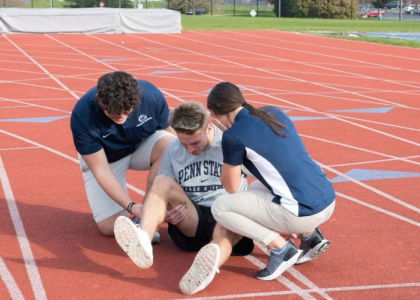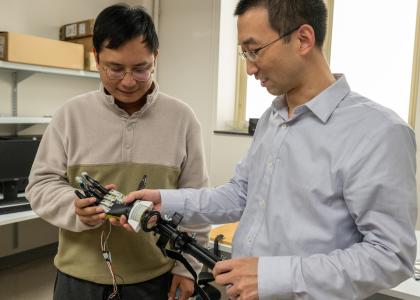What Is Athletic Training?
What is Athletic Training?
What many people think of as Sports Medicine is actually Athletic Training. The Certified Athletic Trainer (ATC®) works with physicians and other medical personnel, employers, patients, parents, guardians, and athletic personnel in the development and coordination of efficient and responsive health care delivery systems. Athletic trainers are integral members of the health care team in secondary schools, colleges and universities, professional sports programs, sports medicine clinics, corporate /industrial, and other health care settings. The athletic trainer’s professional preparation is based on the development of specified educational competencies and clinical proficiencies. Through a combination of formal classroom and clinical instruction and clinical experience, the athletic trainer is prepared to provide health care within each of the following content areas:
- Risk management and injury prevention
- Pathology of injuries and illnesses
- Clinical examination and diagnosis
- Acute care of injury and illness
- Pharmacology
- Therapeutic modalities
- Therapeutic and rehabilitative exercise
- General medical conditions and disabilities
- Nutritional aspects of injury and illness
- Psychosocial intervention and referral
- Health care administration
- Professional development and responsibilities
For more information about the Athletic Training Profession, please visit the National Athletic Trainers' Association (NATA) website at www.nata.org.
Is an Athletic Trainer the same thing as a Personal Trainer or Strength Coach?
NOT EVEN CLOSE!!!! The name of our profession is sometimes confusing because Athletic Trainers don't "train" athletes. Instead, Athletic Trainers are healthcare providers who provide care for both athletes and non-athletes alike! In most states Athletic Trainers must obtain a license to practice and the nationally recognized ATC® credential requires at least a bachelor’s degree from a CAATE accredited program, extensive clinical practice time under the supervision of credentialed professional, repeated demonstration of proficiency in over 680 clinical skills, and passing a very rigorous national certification examination. Personal trainers, on the other hand, are fitness professionals and NOT healthcare professionals. There is little or no regulation of their professional practice and there are very few requirements to obtain a personal training credential (some of which can be obtained with as little as a weekend course). The only similarity between Athletic Trainers and personal trainers is that both work with athletes, but we do VERY different jobs. If you are interested in becoming a personal trainer, you should consider the Fitness Studies Option of the Kinesiology major.
What can you do with an Athletic Training Degree?
Students who complete the Athletic Training Major are eligible to sit for the Athletic Trainer Certification Exam offered by the Board of Certification (BOC). Please visit www.bocatc.org for more information of the certification exam. The exam is typically taken in April of senior year. Students who pass this exam and complete their degree are awarded the professional credential ATC®. ATC is the entry-level credential for practicing Athletic Training. In 47 states (and counting), Athletic Trainers are regulated by the state (typically requiring a license to practice). In order to practice in Pennsylvania, you must obtain a license. Licensure information in Pennsylvania is available from the Pennsylvania State Board of Medicine. Please visit www.dos.state.pa.us/med.
There are a variety of work settings where Athletic Trainers are employed and providing care for both athletes and non-athletes alike. Most of our program’s graduates elect to go on directly to a master's degree program, usually as paid graduate assistants. Of those students entering the workplace after completing their bachelor’s degree, the most common settings nationwide are outpatient clinics with high school coverage and intercollegiate athletics. Penn State graduates tend to find jobs in intercollegiate and professional athletics in numbers higher than the national average. For more information about where Athletic Trainers work please visit the National Athletic Trainers' Association website at www.nata.org.
Is Athletic Training a good major to get me into a Doctor of Physical Therapy Program?
It certainly can be, but not necessarily for everyone. It largely depends on the area of Physical Therapy practice that interests you. First and foremost, you should choose the Athletic Training Major because you genuinely want to become a Certified Athletic Trainer who practices in a sports medicine related area and not just as a means of preparing for another field. Athletic Training and Physical Therapy (PT) can be a wonderful combination of professions for the right student. For students interested in a graduate degree in PT who have most of their interest in sports medicine and orthopedics, Athletic Training is a wonderful major. There is a great deal of overlap in the content and the credentials supplement each other nicely. For students mostly interested in other areas of PT (e.g. in-patient hospital care, neurological & stroke patients, pediatrics, geriatrics) Athletic Training is probably NOT the best choice of majors. The Athletic Training Major requires an extensive clinical time commitment that really is not necessary for students who do not intend to make sports medicine an important part of their future practice. Likewise, Athletic Training is a competitive major with a larger number of qualified applicants than it is possible for us to accept. As you would expect, it is very difficult for the Athletic Training Committee to admit students who do not plan to practice in a sports medicine setting over students who do. There are several undergraduate majors to prepare students for PT and other graduate professions. We HIGHLY recommend that you speak with your advisor who can help you determine which of these majors will best meet your needs. If you are interested in solely becoming a physical therapist, you should consider the Movement Science Option of the Kinesiology major.
How competitive is the Athletic Training Major at Penn State?
The AT Major at Penn State has an established national reputation. In fact, around half of the campus visits by prospective AT students have been from out-of-state students who are looking for the best programs nationally. The end result is that admission to our program is very competitive. As is the case with many in-demand AT programs, students at Penn State do not directly enter the major from high school. Instead, new freshmen enter as pre-major students who then must meet specific criteria before being considered for selection into the AT Major itself. Over the past five admission cycles, we have averaged 50 applicants for roughly 25-30 program openings each year. We narrow the applicant pool based on selection criteria (overall GPA, core GPA, clinical recommendations, and committee interview). GPA is important, but it is not the only factor we consider as our program is not the right fit for everyone. Generally speaking, highly motivated and talented students who visibly demonstrate their enthusiasm and commitment are most likely to be admitted. Some high ability students who have a more reserved personality have had difficulty being selected in the past.
While meeting the following does not guarantee admission, competitive applicants typically...
- have a cumulative GPA of greater than 3.0 for all college courses completed
- actively demonstrate their passion and enthusiasm for athletic training
- ask a lot of questions and get very involved in their clinical observation time instead of watching from a distance
- are VERY energetic, outgoing and flexible. Quiet, reflective students often struggle with their clinical observation time here because they don't demonstrate their passion and enthusiasm as much as they need to in order to be admitted.
- make it obvious that they are here to be healthcare providers and not just because they are sports fans
- treat our athletes like patients and as real people instead of being in awe of them as sports heroes
- demonstrate that they are highly responsible and can be counted on to go the extra mile
- vigorously protect their patients' confidentiality
- apply classroom learning to real-world situations
- take pride in their professionalism, appearance, knowledge, skill, and dedication
- take personal responsibility for their future and their success
- plan for contingencies and have a clear idea of their future professional goals
- understand and embrace the extensive out-of-class time commitment required for the major
- are focused on putting their athletic training skills into practice rather than using athletic training solely as a stepping stone to a graduate program in a different profession.



